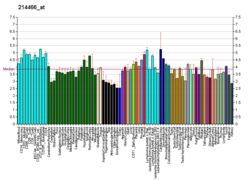GJA5
Gap junction alpha-5 protein (GJA5), also known as connexin 40 (Cx40) — is a protein that in humans is encoded by the GJA5 gene.
Function
[edit]This gene is a member of the connexin gene family. The encoded protein is a component of gap junctions, which are composed of arrays of intercellular channels that provide a route for the diffusion of low molecular weight materials from cell to cell. Mutations in this gene may be associated with atrial fibrillation. Alternatively spliced transcript variants encoding the same isoform have been described.[5]
GJA5 has been identified as the gene that is responsible for the phenotypes observed with congenital heart diseases on the 1q21.1 location. In case of a duplication of GJA5 tetralogy of Fallot is more common. In case of a deletion other congenital heart diseases than tetralogy of Fallot are more common.[6]
Related gene problems
[edit]See also
[edit]References
[edit]- ^ a b c GRCh38: Ensembl release 89: ENSG00000265107 – Ensembl, May 2017
- ^ a b c GRCm38: Ensembl release 89: ENSMUSG00000057123 – Ensembl, May 2017
- ^ "Human PubMed Reference:". National Center for Biotechnology Information, U.S. National Library of Medicine.
- ^ "Mouse PubMed Reference:". National Center for Biotechnology Information, U.S. National Library of Medicine.
- ^ "Entrez Gene: GJA5 gap junction protein, alpha 5, 40kDa".
- ^ Soemedi, R.; et al. (2011). "DPhenotype-Specific Effect of Chromosome 1q21.1 Rearrangements and GJA5 Duplications in 2436 Congenital Heart Disease Patients and 6760 Controls". Hum. Mol. Genet. 21 (7): 1513–1520. doi:10.1093/hmg/ddr589. PMC 3298277. PMID 22199024.
Further reading
[edit]- Andrew L Harris; Darren Locke (2009). Connexins, A Guide. New York: Springer. p. 574. ISBN 978-1-934115-46-6.
- Teunissen BE, Bierhuizen MF (2004). "Transcriptional control of myocardial connexins". Cardiovasc. Res. 62 (2): 246–55. doi:10.1016/j.cardiores.2003.12.011. PMID 15094345.
- Kanter HL, Saffitz JE, Beyer EC (1992). "Cardiac myocytes express multiple gap junction proteins". Circ. Res. 70 (2): 438–44. doi:10.1161/01.res.70.2.438. PMID 1310450.
- Willecke K; Jungbluth S; Dahl E; et al. (1991). "Six genes of the human connexin gene family coding for gap junctional proteins are assigned to four different human chromosomes". Eur. J. Cell Biol. 53 (2): 275–80. PMID 1964417.
- Chen SC; Davis LM; Westphale EM; et al. (1995). "Expression of multiple gap junction proteins in human fetal and infant hearts". Pediatr. Res. 36 (5): 561–6. doi:10.1203/00006450-199411000-00002. PMID 7877871.
- Kanter HL, Saffitz JE, Beyer EC (1994). "Molecular cloning of two human cardiac gap junction proteins, connexin40 and connexin45". J. Mol. Cell. Cardiol. 26 (7): 861–8. doi:10.1006/jmcc.1994.1103. PMID 7966354.
- Mehta PP; Lokeshwar BL; Schiller PC; et al. (1996). "Gap-junctional communication in normal and neoplastic prostate epithelial cells and its regulation by cAMP". Mol. Carcinog. 15 (1): 18–32. doi:10.1002/(SICI)1098-2744(199601)15:1<18::AID-MC4>3.0.CO;2-O. PMID 8561862. S2CID 23480353.
- Gelb BD; Zhang J; Cotter PD; et al. (1997). "Physical mapping of the human connexin 40 (GJA5), flavin-containing monooxygenase 5, and natriuretic peptide receptor a genes on 1q21". Genomics. 39 (3): 409–11. doi:10.1006/geno.1996.4516. PMID 9119381.
- Kilarski WM; Dupont E; Coppen S; et al. (1998). "Identification of two further gap-junctional proteins, connexin40 and connexin45, in human myometrial smooth muscle cells at term". Eur. J. Cell Biol. 75 (1): 1–8. doi:10.1016/S0171-9335(98)80040-X. PMID 9523149.
- van Rijen HV, van Kempen MJ, Postma S, Jongsma HJ (1998). "Tumour necrosis factor alpha alters the expression of connexin43, connexin40, and connexin37 in human umbilical vein endothelial cells". Cytokine. 10 (4): 258–64. doi:10.1006/cyto.1997.0287. PMID 9617570.
- Vozzi C; Dupont E; Coppen SR; et al. (1999). "Chamber-related differences in connexin expression in the human heart". J. Mol. Cell. Cardiol. 31 (5): 991–1003. doi:10.1006/jmcc.1999.0937. PMID 10336839.
- Haefliger JA, Goy JJ, Waeber G (2000). "Sporadic cases of dilated cardiomyopathies associated with atrioventricular conduction defects are not linked to mutation within the connexins 40 and 43 genes". Eur. Heart J. 20 (24): 1843. doi:10.1053/euhj.1999.1718. PMID 10581143.
- van Rijen HV, van Veen TA, Hermans MM, Jongsma HJ (2000). "Human connexin40 gap junction channels are modulated by cAMP". Cardiovasc. Res. 45 (4): 941–51. doi:10.1016/S0008-6363(99)00373-9. PMID 10728420.
- Oviedo-Orta E, Hoy T, Evans WH (2000). "Intercellular communication in the immune system: differential expression of connexin40 and 43, and perturbation of gap junction channel functions in peripheral blood and tonsil human lymphocyte subpopulations". Immunology. 99 (4): 578–90. doi:10.1046/j.1365-2567.2000.00991.x. PMC 2327182. PMID 10792506.
- Vis JC; Nicholson LF; Faull RL; et al. (2002). "Connexin expression in Huntington's diseased human brain". Cell Biol. Int. 22 (11–12): 837–47. doi:10.1006/cbir.1998.0388. PMID 10873295. S2CID 8034526.
- Valiunas V, Gemel J, Brink PR, Beyer EC (2001). "Gap junction channels formed by coexpressed connexin40 and connexin43". Am. J. Physiol. Heart Circ. Physiol. 281 (4): H1675–89. doi:10.1152/ajpheart.2001.281.4.H1675. PMID 11557558. S2CID 960859.
- Kaba RA; Coppen SR; Dupont E; et al. (2003). "Comparison of connexin 43, 40 and 45 expression patterns in the developing human and mouse hearts". Cell Commun. Adhes. 8 (4–6): 339–43. doi:10.3109/15419060109080750. PMID 12064615. S2CID 23388741.
- Cronier L; Defamie N; Dupays L; et al. (2003). "Connexin expression and gap junctional intercellular communication in human first trimester trophoblast" (PDF). Mol. Hum. Reprod. 8 (11): 1005–13. doi:10.1093/molehr/8.11.1005. PMID 12397213.
- Simon AM, McWhorter AR (2002). "Vascular abnormalities in mice lacking the endothelial gap junction proteins connexin37 and connexin40". Dev. Biol. 251 (2): 206–20. doi:10.1006/dbio.2002.0826. PMID 12435353.
- Strausberg RL; Feingold EA; Grouse LH; et al. (2003). "Generation and initial analysis of more than 15,000 full-length human and mouse cDNA sequences". Proc. Natl. Acad. Sci. U.S.A. 99 (26): 16899–903. Bibcode:2002PNAS...9916899M. doi:10.1073/pnas.242603899. PMC 139241. PMID 12477932.
- Dupays L; Mazurais D; Rücker-Martin C; et al. (2003). "Genomic organization and alternative transcripts of the human Connexin40 gene". Gene. 305 (1): 79–90. doi:10.1016/S0378-1119(02)01229-5. PMID 12594044.





